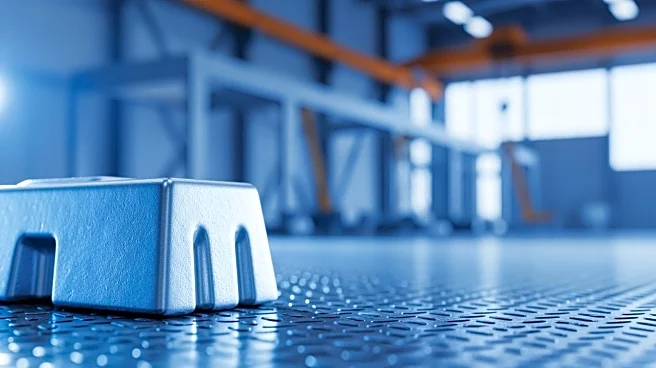What's Happening?
Ethiopian Investment Holdings has entered into a preliminary agreement with Rusal, a major aluminum producer, to establish a large-scale aluminum smelter plant in Ethiopia. The proposed facility is expected to have an annual production capacity of 500,000
metric tons, with the first phase costing approximately $1 billion. The project, covered by a memorandum of understanding, is anticipated to take three to four years to complete and will have an operating period of up to 50 years. Preliminary activities, including site identification and a comprehensive feasibility study, are already underway to ensure timely progress. This development follows Ethiopia's recent agreements with Nigeria's Dangote Group for a fertilizer manufacturing plant and with Russia for a nuclear power plant.
Why It's Important?
The agreement between Ethiopian Investment Holdings and Rusal marks a significant step in Ethiopia's industrial development, potentially boosting the country's economy and creating job opportunities. The aluminum plant is expected to enhance Ethiopia's manufacturing capabilities and attract further foreign investment. This aligns with Ethiopia's broader strategy to diversify its economy and reduce reliance on agriculture. The involvement of Rusal, a prominent player in the aluminum industry, underscores the project's potential to elevate Ethiopia's position in the global aluminum market. Additionally, the project complements other major industrial initiatives in the country, such as the fertilizer and nuclear power plants, indicating a robust trajectory towards industrialization.
What's Next?
As the project progresses, stakeholders will focus on completing the feasibility study and site identification to ensure timely development. The successful implementation of the aluminum plant could lead to increased foreign investment and partnerships in Ethiopia's industrial sector. The government may also explore additional infrastructure projects to support the plant's operations and maximize its economic impact. Observers will be watching for further announcements regarding financing, construction timelines, and potential environmental assessments. The collaboration with Rusal may pave the way for future partnerships with other international companies seeking to invest in Ethiopia's growing industrial landscape.
Beyond the Headlines
The establishment of the aluminum plant in Ethiopia could have broader implications for regional economic integration and trade. As Ethiopia strengthens its industrial base, it may become a more attractive partner for neighboring countries seeking to enhance their own manufacturing sectors. The project also raises questions about environmental sustainability and the need for responsible resource management, given the potential ecological impact of large-scale industrial operations. Additionally, the collaboration with Rusal highlights the geopolitical dimensions of foreign investment in Africa, as countries like Russia seek to expand their influence through economic partnerships.
















